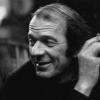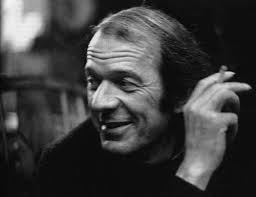Description
The Deleuze Seminars is a collection of audio recordings, transcriptions, and English translations of, and supplemental materials from, the lectures French philosopher Gilles Deleuze gave during his career at the University of Paris 8.
“The Movement-Image: Bergsonian Lessons on Cinema” was a 21-lecture seminar given from November 1981 to June 1982. This seminar marks the first of four consecutive seminars in which Deleuze presents his theory of film. Here, in large part through the philosophy of Henri Bergson, Deleuze rethinks film as a movement-image, as opposed to a succession of still frames or photographic images. Throughout the course he references a wide variety of filmmakers, critics, and philosophers. As a precursor to the publication of Deleuze’s first of two volumes on cinema, Cinema 1: The Movement-Image (Cinéma 1. L'Image-Mouvement, 1983), this seminar is a valuable resource to researchers interested in Deleuze’s film theory, as well as his larger philosophical oeuvre.
In the 04 May 1982 lecture, topics of discussion include: the large and small forms of cinema; the cinema of the post-war period; the questioning of the plot; the Company-city, Hollywood and New York; two aspects of the American dream: 1) the founding crucible of minorities constituting the same nation, and 2) the American capacity to change the situation; the crisis of the image, the image list and the technical evolution; the novel; the American novelist and artist John Dos Passos; the rupture of American cinema with the two forms of the action-image; the urban ballad and its non-formative aspect; the urban spaces of American director Sidney Lumet; the American director Martin Scorsese; the Greek-American director John Cassavetes; the American comedian and director Woody Allen; the random sequence of events; the Actors Studio; the game and the players; the non-belonging of the event and the actor; three characteristics of the concept of the news item (le fait divers): 1) a series of events taken (prélevés) from a dispersive reality, 2) the event in the process of becoming (se faire), and 3) the event that belongs only partially, or not at all, to whom it happens; the world of cliché-images, sounds or optics and outsides or insides; the physical and mental universe of cliché; news, biographies and the eye of the camera; and the refrain.
This dataset includes: two mp3 recordings of the lecture (total time, 1:45:13), an aggregate version of the audio recordings into a single mp3, and the complete French transcription of the recorded lecture in both pdf (22 pp) and plain text.
-
Les Séminaires de Deleuze sont une collection d'enregistrements audio, de transcriptions et de traductions en anglais et de documents complémentaires des conférences que le philosophe français Gilles Deleuze a donné lors de sa carrière à l'Université de Paris 8.
«L’image-mouvement, Leҫons bergsoniennes sur le cinéma» était un séminaire de 21 conférences donné de novembre 1981 à juin 1982. Ce séminaire marque le premier de quatre séminaires consécutifs dans lesquels Deleuze présente sa théorie du film. Ici, en grande partie grâce à la philosophie d'Henri Bergson, Deleuze repense le film comme un image-mouvement, par opposition à une succession d'images fixes ou d'images photographiques. Tout au long du cours, il fait référence à une grande variété des cinéastes, des critiques et des philosophes. En tant que précurseur de la publication des premiers volumes de Deleuze sur le cinéma, Cinéma 1. L'Image-Mouvement (1983), ce séminaire est une ressource précieuse pour les chercheurs intéressés par la théorie du film de Deleuze, ainsi que sa plus grande œuvre philosophique.
Dans la conférence du 4 mai 1982, les sujets de discussion comprennent: la grande forme et la petite forme du cinéma; le cinéma de l'Après-guerre; la mise en question de l'intrigue; la ville-Compagnie, Hollywood et New York; les deux aspects du rêve américain: 1) le creuset fondateur des minorités constituant la même nation, et 2) la capacité des américaines au changement de la situation; la crise de l'image, la liste de l’image et l'évolution technique; le roman; le romancier et artiste américain John Dos Passos; la rupture du cinéma américain avec les deux formes de l'image-action; la ballade urbaine et son aspect non formateur; les espaces urbains du réalisateur américain Sidney Lumet; le réalisateur américain Martin Scorsese; le réalisateur gréco-américain John Cassavetes; le comédien et réalisateur américain Woody Allen; l’enchainement d'evenements au hasard; l’Actor’s Studio; le jeu et les joueurs; la non appartenance de l'événement et l'acteur; les trois caractéristiques du concept du fait divers: 1) une série d'événements prélevés d'une réalité dispersive, 2) l'événement en train de se faire, et 3) l'événement qui n'appartient qu’en partie, ou pas du tout, à celui à qui ҫa arrive; le monde des images-clichés, les sonores ou les optiques et les extérieurs ou les intérieurs; l'univers physique et mental du cliché; les actualités, les biographies et l'œil de la caméra; et la ritournelle.
Cite this work
Researchers should cite this work as follows:
- Gilles Deleuze (2017). The Movement-Image: Bergsonian Lessons on Cinema: Lecture 17, 04 May 1982. Purdue University Research Repository. doi:10.4231/R7J101C9
Tags
Notes
This research has been generously supported through a grant from the College of Liberal Arts, Purdue University.
The description of this dataset is based on the meticulous work of Frédéric Astier, whose Les cours enregistrés de Gilles Deleuze, 1979-1987 has catalogued Deleuze’s seminars for those years.
Special thanks to the family of Gilles Deleuze and the University of Paris 8 for permission to reproduce the material published here.
The Deleuze Seminars
This publication belongs to the The Deleuze Seminars group.

